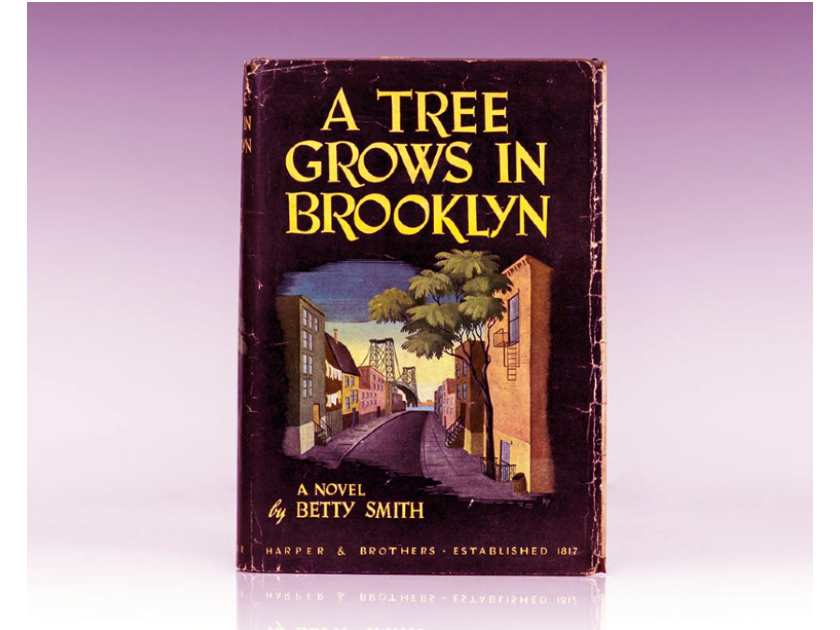
Like Scout Finch in To Kill a Mockingbird and Matilda Wormwood in Matilda, Francie Nolan — the protagonist of Betty Smith’s A Tree Grows in Brooklyn—is an inspiration to bookish young girls everywhere, and a testament to the way reading can magnify one’s life. A Tree Grows in Brooklyn is an American classic I missed growing up, but one I’m happy to have read recently. While the novel features a young protagonist in the character of Francie (who is eleven at the beginning of the novel and almost seventeen at its end), it explores themes and issues well suited to an adult readership.
Since A Tree Grows in Brooklyn focuses on the trials and joys of a German-Irish American family in the 1910s, I did not expect it to also highlight Jews and Jewish culture. But, inevitably (and it’s clear that Smith knew this), a story about Brooklyn is also a story about its Jewish community. Although the novel depicts antisemitism, including the prejudices of the Nolan family, the novel itself is far from antisemitic. Instead, Smith chooses to explore why it is that the uneducated people of early twentieth century Brooklyn feel the way they do about Jews. Considering the fact that the novel was published in 1943, this approach is significant.
The first instance of antisemitism occurs early on in the book when friends of Francie’s younger brother, Neeley, “took time out to bedevil a little Jew boy on his way to temple.” The Jewish boy, evidently used to such tauntings, is playful with the other children and not too affected by their badgering. Neeley says, “I know that kid. He’s a white Jew,” quoting something he has heard his father say in the past, a positive interpretation. His friend replies, “There could never be a white Jew.”
When I first read this passage, I winced. Why was Smith dwelling on her characters’ feelings toward Jews in particular? Was she falling into the trap of antisemitism, or merely depicting it? The more I read on, however, the more Smith’s intention revealed itself in the careful construction of her novel.
When Francie goes to a pickle store and asks the Jewish owner for “a penny sheeny pickle” , the man spits the words “Goyem! Goyem!” at her, hating the word “sheeny.” Francie is taken aback, as she “meant no harm. She didn’t know what the word meant really. It was a term applied to something alien, yet beloved.”
Smith chooses to explore why it is that the uneducated people of early twentieth century Brooklyn feel the way they do about Jews.
Smith uses this moment to delve into the root of not only antisemitism, but all childhood prejudices. Francie has no malice; these thoughts and words were ingrained in her before she could realize what they mean. This uncomfortable notion speaks to how antisemitism can flourish in people who don’t even consciously dislike Jewish people, who might live among them and yet still see them as alien. Such sentiments are so casually a part of Francie’s life and upbringing that she actively needs to parse them to see the harm. As she notes, for example, “Most Brooklyn Germans had a habit of calling everyone who annoyed them a Jew.” Francie’s interactions with Jews are oftentimes uncomfortable for a reason; it is only through engaging with them as fellow beings that she is able to transcend her preconceptions and see them as something other than “other.”
Near the end of the novel, Smith reveals how the characters’ stance toward Jews has shifted, a subplot in its own right. When Francie’s aunt Sissy, who is pregnant for the eleventh time after her previous ten children were all stillborn, insists on getting a Jewish doctor to perform the labor rather than the traditional midwife, Francie’s mother is aghast. Their other sister says, “Like should stick to like. You don’t see Jews calling in Christian doctors.” Sissy replies, “Why should they … when they and everybody else knows that Jewish doctors are smarter.”
When the baby is born, Sissy initially thinks from the blue of his skin that he, like all the others, is dead, before the doctor gives him oxygen. “Sissy took [the doctor’s] hands and covered them with kisses. And Dr. Aaron Aaronstein was not embarrassed about her emotionalism the way a Gentile doctor would have been.” In return, she gives her son the doctor’s name as a middle name. This positive depiction of Jewish people is also rooted in stereotypes. But it is still a departure from many insensitive portrayals of the time period.
While A Tree Grows in Brooklyn takes place years before World War II, it was written at a time when Jews were being murdered in Europe. Smith is too sharp a writer for her contemplations on antisemitism to be coincidental. She portrays a world where people of all different backgrounds live among each other — if not quite in harmony, still as neighbors. With grace and understanding, Smith seems to be saying, perhaps this kind of world is once more within our reach. Immersed in the novel, I found myself wishing more contemporary authors would embrace this heady mix of realism and optimism.
Ariella Carmell is a Brooklyn-based writer of plays and prose. She graduated from the University of Chicago, where she studied literature and philosophy. Her work has appeared in Alma, the Sierra Nevada Review, the Brooklyn review, and elsewhere.